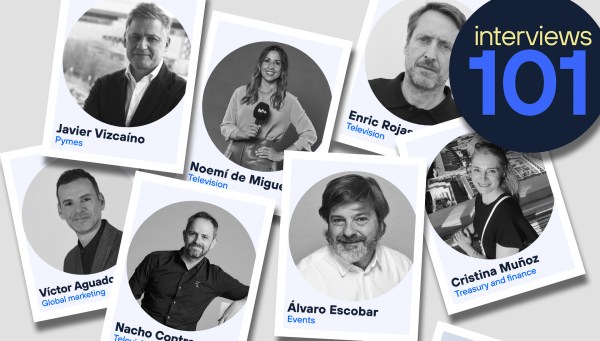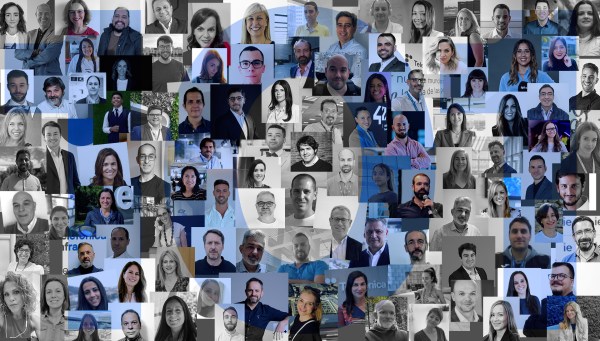Tell us a little about yourself. What does your job at Telefónica involve?
I am currently part of the AI Ethics team at Telefónica. We are responsible for ensuring the responsible and ethical use of artificial intelligence at Telefónica, playing a crucial role in the governance of AI at Telefónica.
I have been part of this team for approximately 4 years, witnessing its birth and evolution, which has been very satisfying. Since I arrived at Telefónica in 2018 as a UX Designer, I have not stopped learning, and these last few years have been especially intense in terms of learning and adaptation, as working in AI implies constant development and discovery.
The AI Ethics team, together with the Global Compliance team -with whom we work closely- is responsible for ensuring the correct implementation of the AI governance model. We work across the Telefónica group, which means we have contact with all areas and different profiles within the company. This also provides very valuable learning opportunities, which I love.
Our AI governance model was approved in 2023 and defines processes and determines roles associated with specific responsibilities, allowing us to harness the full potential of AI while protecting people and minimising potential risks throughout the life cycle of artificial intelligence systems in all activities in which the Telefónica Group participates: design, development, acquisition, commercialisation and use. This model also allows us to comply with the AI regulations that apply to us, such as the AI Act in Europe (the first AI regulation in the world).
One of the key processes in governance is the management of risk analysis of AI use cases, for which we are also responsible. Through this analysis, we can assess whether our Artificial Intelligence Principles are being adequately fulfilled. We also analyse whether there are risks related to people, the environment or society. The result of the analysis is a series of measures that we provide to the business units to mitigate the detected risks, ensuring that our AI products and services go into production with all the guarantees.
We are also responsible for promoting a culture of responsible AI, which is key to the cultural transformation required for the adoption of artificial intelligence in companies. AI is no longer the preserve of just a few technical profiles; we now find it in all areas of the company. That is why it is necessary to create a culture of trust and continuous improvement, ensuring that AI is implemented effectively, aligned with Telefónica’s values and with a positive impact on employees and end users.
What is responsible AI?
Responsible artificial intelligence is that which is developed in a reliable and people-centred way. It is designed in a way that respects and promotes the protection of safety, health, human rights and the environment.
Our strong commitment to human rights means that we work to identify, prevent and mitigate the possible negative impacts that technology may have on people, society or the environment. We believe that AI can contribute to creating a more inclusive society and offering better opportunities for all.
Telefónica was one of the first companies in the world to have ethical principles for artificial intelligence to guarantee a positive impact on society. Our principles for AI, which we defined and published for the first time in 2018, are the ethical code that has guided us in the design, development and implementation of responsible AI.
These principles are fully aligned with Telefónica’s values. In 2024, we updated them to include all the maturity acquired in their application since 2018. We also took the opportunity to create a new principle, ‘AI committed to the environment’, to reinforce our commitment to environmental impact.
How can artificial intelligence be used responsibly?
The application of AI can have some negative impacts that are often unintentional and can affect people, society and the environment, such as:
- Possible biases resulting from the data used or from the people who develop the models, which can lead to discrimination against certain groups of people.
- Lack of transparency and understanding of their responses.
- Cybersecurity and privacy failures.
- Lack of human oversight, which can lead to errors and unethical decisions.
- Consumption of natural resources or increase in the carbon footprint…
To avoid these kinds of negative impacts, we must reflect on them when building our AI use cases. Our AI principles guide business areas in these reflections and our governance model provides measures to avoid or minimise these risks. Training and awareness programmes are essential to reinforce these elements.
If we are talking about how to use generative AI responsibly in our day-to-day lives, we need to understand its limitations and manage our expectations about what it can do. We must not forget that its results can be inaccurate, biased and sometimes even wrong. It is therefore essential that we monitor the content of the responses it offers us.
What professional profile is needed for this type of work?
The incorporation of this type of team and role in companies is a relatively recent practice. As I mentioned before, the management of AI has gone from being a solely technical challenge to an organisational one. A multidisciplinary approach combining technical, humanistic and legal knowledge is needed to manage these processes. In addition, it is important to be close to the business in order to be able to implement it effectively in day-to-day practice.
At Telefónica, different profiles collaborate to ensure the responsible use of AI, including business, technical, legal, sustainability, privacy, auditing and cybersecurity areas, among others.
Humanities profiles are fundamental in the development of artificial intelligence because they provide perspectives that technology alone cannot address. We need to combine technical knowledge with a critical and humanistic vision that integrates ethics, human behaviour and diversity and inclusion to benefit society.
In the development of responsible AI, diversity in teams is very important because it helps to create systems that are more fair, equitable and aligned with the needs of different people. At Telefónica, we promote diversity in our AI teams to ensure that our solutions are fair, inclusive and responsible.
What can be done to promote a culture of responsible artificial intelligence?
Training, training and more training. To promote a culture of responsible AI, it is necessary to train employees about the opportunities and risks that AI offers and to equip them with the skills necessary to develop and implement this technology responsibly, in line with our governance model and our ethical principles for AI. In addition, we work to foster an approach of critical thinking so that employees can more effectively evaluate the ethical and social implications of AI.
The AI Ethics team also strives to ensure that all roles involved in AI governance at Telefónica are adequately prepared to assume their functions through welcome programmes, specific training sessions, and close and continuous collaboration. All of this is materialised in the promotion of good practices within the framework of our AI governance.
To make this information accessible to all employees, we have published two guides: the ‘Guide to Generative AI for Employees’ which offers a series of guidelines for using generative AI on a day-to-day basis and the ‘Guide to Responsible AI for Business Areas’, aimed at guiding teams in the responsible development of AI products and services.
In short, promoting a culture of responsible artificial intelligence requires a continuous commitment to training and collaboration. Equipping employees with the necessary knowledge and skills is essential to ensure that AI is applied ethically and effectively.
Who are the people working at Telefónica that you would nominate for this interview that you consider excellent in their work?
I am very lucky to work with exceptional professionals who fulfil their roles within AI governance in an outstanding way and whose dedication to this project is exemplary. I would like to nominate:
- Javier Sáez Tovar, who participates as RAI Champion (Responsible AI Champion – key role in governance) of Telefónica Tech and who brings great value to the project with his legal vision, as well as his proactivity.
- Blanca Gómez Gómez, from the Global Compliance team, who works hard to make this project a reality and whose willingness and professionalism are key to its implementation.







